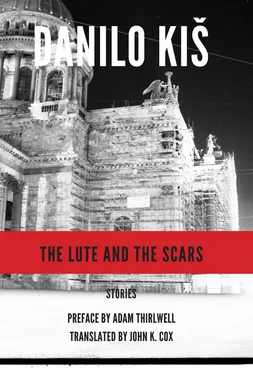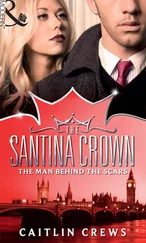And then, on that morning — he knew neither when nor how — the calm descended. He accepted the unacceptable: for him it was all over. His days, his hours were numbered. He made an attempt to take stock of how he had lived, seeing his life from the others’ points of view, and it made him chuckle to himself. He was going to die, therefore, having filled up his life with solitude, self-abnegation, and labor; for all human endeavors teach but this one thing: that the meaning of human activity on earth resides in law, moderation, order, and renunciation. And everything great and beautiful that is made, is made with blood or sweat, and in silence . Who had said that? Had he read it somewhere or perhaps even written it himself? But the point was that, at this time, this thought seemed to him at the very least accurate, if not all too comforting.
He thought how nice it would be to have at his side one of those noble and sage individuals whom he had come to know over the course of his life: Alaupović, or Mr. Ivo Vojnović. In his lifetime he had met only two or three people as wise as they. The rest were like the majority of the human race: narrow-minded and selfish, with no sense of beauty, lacking sympathy for others, ignorant. They were people guided only by instinct and ambition — for love and food, for fame and fleeting glory. And whenever they entered his life, they created disorder, like an army occupying a city.
He looked at himself with others’ eyes and took stock of his life as the others, the strangers, saw it: he was leaving behind his collected works, in which his biography, his language, stood mingled with the history of his nation; this guaranteed him the thing people call immortality. Among his papers there were still a few texts that he kept, painstakingly sorted and selected, in bundles: poems, journals, notes. He had removed from these manuscripts everything that could have compromised him in the eyes of posterity, every trace of personal life, every private item, so that he would remain, in the eyes of future generations, even more of an abstraction, even more a writer, but less of a man of flesh of blood. There was, in this gesture of his, something both bitter and just: after all, he had spent all his days in the domain of fiction, in the world of Platonic ideals, and every side-trip he’d made into life turned into torment and misfortune, embarrassment and monotony. Every real-life decision outside the world of pure ideas, beyond the quiet and solitude, had brought him only injury; every action had missed the mark, every encounter with others had proved a setback, and every success was only a fresh misfortune. So he removed all names other than his own from those texts. He removed this entire ephemeral world that could only besmirch his name: because proving a fool to be a fool amounts to compromising oneself.
Then the thought flashed abruptly through his mind, like an electric shock extending deep into his core, that he had not paid off his debts. Not the spiritual but the earthly ones. (As for the spiritual debts, not a single person has ever paid them back to anyone: not to God nor one’s own mother, neither to one’s language nor one’s homeland.) No, he wasn’t thinking of those debts; he’d be taking them along with him into that other world. (And if that world truly exists, if there really is a reason for it to exist, then it is precisely this: for a person to pay back his creditors.) He was simply thinking of the kind of debts that one can settle with money, even if only in a symbolic way, like a word of greeting, a handshake, now that he could no longer postpone this any further, now that the time had come to settle up with this world. Even the modest subvention — of two hundred crowns — that was provided to him by the Croatian “Progress” society and that reached him every month without fail (something that was a genuine miracle in these turbulent times and was a real credit to those Habsburg institutions, whatever else people thought of them) had to be parsed sensibly, distributed wisely: so that everybody benefited from it and no one was wronged.
He watched as the drops bulged in the bottle fastened over his head, and he counted them, one by one, the way one counts the beads of a rosary, or gold coins.
To Ivan Matkovšek, the Wachtmeister , who opened my eyes to landscapes, the way a soldier learns to read terrain from a map: two crowns.
To Ajkuna Hreljić, the first person to take my hand and lead me across the bridge: two crowns.
To Ana Matkovšek, who taught me the language of flowers and herbs: two crowns.
To Draginja Trifković, the schoolteacher, who taught me my first letters of the alphabet: two crowns.
To Idriz Azizović, nicknamed “the Arab,” who taught me how to listen to the human voice, which can be a musical instrument: two crowns.
To Ljubomir Popović, who taught me kindness, because it isn’t enough simply to have a kind heart, and goodness has to be learned like the alphabet: two crowns.
To Milan Gavrilović, who taught me friendship, because friendship also has to be learned like a foreign language: two crowns.
To Ratko Bogdanović, who taught me that friendship is not sufficient, since even it can be selfish: two crowns.
To Jovan Vasić, schoolteacher, who encouraged me when I needed bravery to take the path of literature: two crowns.
To Tugomir Alaupović, who watched over my soul and my body as he did his very own: two crowns.
To Mijo Poljak, professor, who enabled me to read German, which was most useful throughout my life and furnished me with intellectual diversion: two crowns.
To Dimitrije Mitrinović, who revealed to me the existence of other worlds, better and happier, beyond these hapless provincial backwaters: two crowns.
To Vladimir Gaćinović, who uncovered for me that region of the world and the soul that is like unto the dark side of the moon: two crowns.
To Bogdan Žerajić, who poisoned me with doubt about the worth of words, leading me to regard them with distrust and weigh them out one by one, as if they were gold pieces: two crowns.
To Fanika and Evgenija Gojmerac, who poisoned me with music and love; but music and love — they are like twin sisters holding hands. one of them playing a polonaise by Chopin and the other kindling the holy fire of love in me with her poems and letters. for in the beginning was love: four crowns.
A drop had separated from the bottle, and another now started to well up in its place. That’s fitting, he thought. That one was about two people, so each deserves a bead of the rosary; each deserves a memory.
To Milan Rešetar, Jozef Jireček, Vilhelm Jeruzalem, Oskar Evald, Jozef Klem, my professors, who taught me that knowledge is everything, while ignorance begets fanaticism and spiritual darkness: ten crowns.
To Doctor Oskar Aleksander, laryngologist from Ilica Street, who operated on my throat after explaining to me in advance the point of the surgical procedure and who treated me like a human being, not a sheep: two crowns.
To the waiter in the “Green Salon” in Krakow, who served me herbal tea the way I like it, and the way the state of my health requires, and who did so gladly and with a smile: two crowns.
To Helena Iržikovski, who instructed me in the deciphering of the “divine hieroglyphics”—musical notes — so that I wouldn’t stand there, dumb as an ox, before this Gothic architecture in lyrical form: two crowns.
To Jan Loc Nepomucen, who disclosed to me the fact that upon the magnificent tree of languages every bird sings in its own way, and that our preferences for certain languages are every bit as individual, arbitrary, and mysterious as our choices in love: two crowns.
To Marjan Zdjehovski, who laid bare for me the deep roots of that Slavic linguistic tree from which branched off the languages of Pushkin, Słowacki, Murn, and my “Bosnian,” too: two crowns.
Читать дальше












